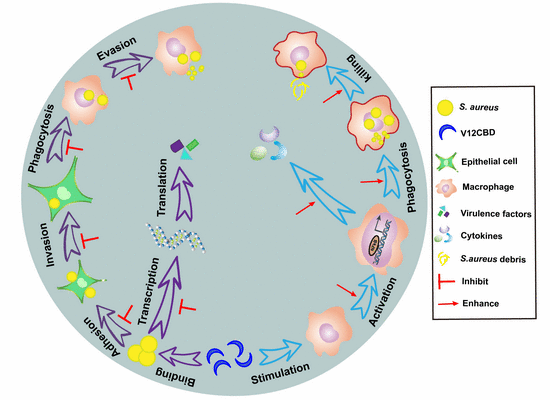New anti‐infective approaches are much needed to control multi‐drug‐resistant (MDR) pathogens, such as methicillin‐resistant Staphylococcus aureus (MRSA).
In a recent study, the research group led by Prof. WEI Hongping in Wuhan Institute of Virology of the Chinese Academy of Sciences found for the first time that a recombinant protein derived from the cell wall binding domain (CBD) of the bacteriophage lysin PlyV12, designated as V12CBD, could attenuate S. aureus virulence and enhance host immune defenses via multiple manners.
After binding with V12CBD, S. aureus became less invasive to epithelial cells and more susceptible to macrophage killing. The expressions of multiple important virulence genes of S. aureus were reduced 2.4‐ to 23.4‐fold as response to V12CBD. More significantly, V12CBD could activate macrophages through NF‐κB pathway and enhance phagocytosis against S. aureus. As a result, good protections of the mice from MRSA infections were achieved in therapeutic and prophylactic models.
These unique functions of V12CBD would render it a novel alternative molecule to control MDRS. aureus infections.
The results have been published in the EMBO Journal entitled "Staphylococcus aureus virulence attenuation and immune clearance mediated by a phage lysin-derived protein".
This work was supported by the National Natural Science Foundation of China and Chinese Academy of Sciences.

The recombinant phage lysin‐derived protein, V12CBD, attenuates Staphylococcus aureus virulence and enhances host innate immunity via different mechanisms, thus serving as a potential therapeutic and prophylactic candidate for anti‐virulence therapy. Image by WEI Hongping
Contact:
WEI Hongping
E-mail: hpwei@wh.iov.cn
Wuhan Institute of Virology, Chinese Academy of Sciences, Wuhan 430071, China (http://english.whiov.cas.cn/)